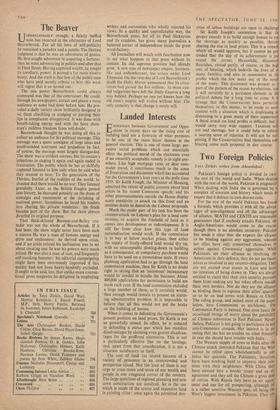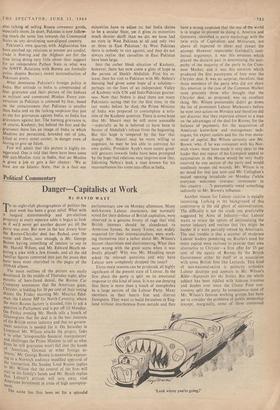Two Foreign Policies
TAYA ZINKIN writes from Ahmedabad : Pakistan's foreign policy is divided in two: the rest of the world and India. When dealing with the rest of the world, Pakistan is pragmatic. When dealing with India she is governed by 3 complex of emotion and history which tends to ' ensure that it defeats its own dearest ends.
For the rest of the world Pakistan has found a formula which provides it with all the advatr tages of non-alignment and all the advantages of alliance. SEATO and CENTO are reasonable guarantees that if anybody attacks Pakistan, the Anglo-Americans would come to the rescue, though there is no absolute certainty. Pakistan has made it clear that she expects the alliance to be binding against any aggression, whereas her allies have only committed themselves to action against Communist aggression. While Pakistanis see their alliance as involving the Americans in their defence, they do not see then? selves as involved in any counter-obligation. They are not excited over events in Laos and have no intention of being drawn in. They are always entitled to claim that their own security prevents them from making any but token efforts outside their own borders. Nor do they see the alliance as binding them to espouse their allies' quarrels or to be on bad terms with Russia or China. The ruling group, and indeed most of the popo' lation, hate Communism as un-Islamic. The Communist Party is banned. One even hears the occasional twinge of worry about the possibility' of Chinese subversion in East Pakistan. Never- theless, Pakistan is not going to participate in any anti-Communist crusade. Her interest is in co' suring that she has no trouble on other frontiers in case she should have trouble with India.
The Western supply of arms to India after the Chinese attack reminded Pakistan that the West cannot be relied upon wholeheartedly to enr brace her quarrels. The Pakistanis, therefore, have been working hard to improve their rela- tions with their neighbours. With China they have entered into a border treaty and an air agreement and they sell the Chinese a great deal of cotton. With Russia they have an air agree' ') ment and one for oil prospecting, although 00
is a rather sensitive Western spot, oil being the I West's biggest investment in Pakistan. They are also talking of selling Russia consumer goods, especially shoes. In short, Pakistan is now follow- ing much the same line towards the Communist Slates as any developing non-aligned country.
Pakistan's own quarrel with Afghanistan has been patched up; relations at present are cordial, trade is flowing and the Afghans are for the time being doing very little about their support for an independent Pathan State in what was the NWFP. Relations with Burma are formally polite, despite Burma's recent nationalisation of Pakistani assets.
What dominates Pakistan's foreign policy is India. Her attitude to India is compounded of fear, grievance and their picture of the Indians as militant and communal Hindus. Every con- versation in Pakistan is coloured by fear, based on the consciousness that Pakistan is smaller than India and on the lurking suspicion that just as she has grievances against India, so India has grievances against her. The burning grievance is, of course, Kashmir; but behind the fear and the grievance there lies an image of India in which Muslims are persecuted, hounded out of jobs, killed at every street corner, in danger even of having to give up Islam.
Few will admit that this picture is highly ex- aggerated. One is told that there have been some 600 anti-Muslim riots in India, that no Muslim is given a job or gets a fair chance: 'We at least are an Islamic State, that is a fact our minorities have to adjust to; but India claims to be a secular State, yet it gives its minorities much shorter shrift than we do; we have had no riots in West Pakistan at all and only two or three in East Pakistan.' In West Pakistan there is nobody to riot against, and they do not always realise that casualties in East Pakistan have been large.
Into the rather bleak situation of Kashmir, however, there has now come a glint of hope in the person of Sheikh Abdullah. First his re- lease, then his visit to Pakistan with Mr. Nehru's blessing had given some hope of a solution— perhaps on the lines of an independent Valley of Kashmir with UN and Indo-Pakistan guaran- tees. Now that Nehru is dead there are many Pakistanis saying that for the first time, in the last weeks before he died, the Prime Minister of India was prepared to contemplate a solu- tion of the Kashmir question. There is some hope that Mr. Shastri may be still more amenable —especially as he is believed to have been in favour of Abdullah's release from the beginning. But this hope is tempered by the fear that though Mr. Shastri may be more willing to negotiate, he may be less able to convince his own public. President Ayub's most recent good- will gestures towards India have been prompted by the hope that relations may improve now that, following Nehru's lead, a man known for his reasonableness has come into office in India.



































 Previous page
Previous page